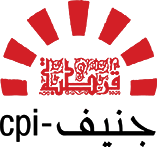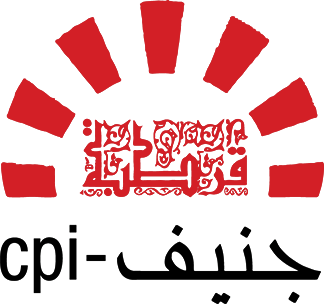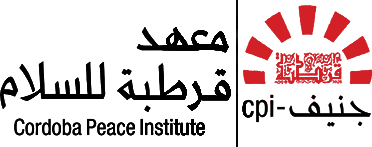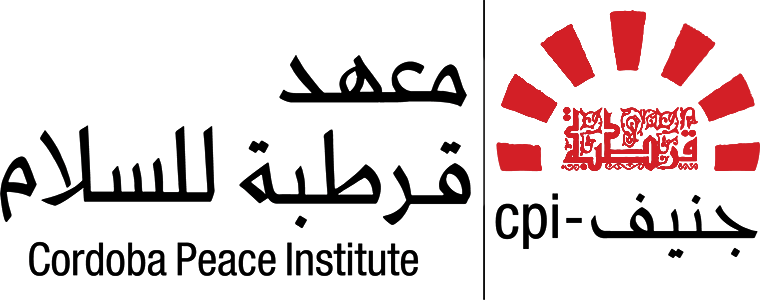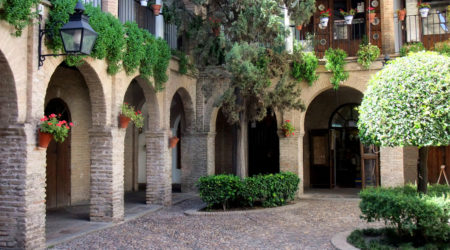The Cordoba Update 7/2016

| In line with the programmes and projects funded by partners of the Cordoba Foundation of Geneva, updates and information are included under the following themes: |
|
ISLAMIST-SECULAR RELATIONS / RELATIONS ENTRE SÉCULIERS ET ISLAMISTES
Libya, 04.04.2016: International Support is not Enough for Sarraj to Hold Tripoli
On Wednesday 30 March, Faiz al-Sarraj, president-designate of the UN-backed Government of National Accord (GNA) arrived in Bu-Setta naval base in Tripoli. Sarraj’s arrival was secured by Misratan armed groups, especially Al Nawasi and the Tripoli-based Rada’a militia.
Nouri Bousahmin, president of the General National Congress (GNC) called on Sarraj to leave Tripoli, and declared a state of emergency. There was sporadic exchange of gunfire between armed groups supporting the GNA and GNC, especially after some of Sarraj’s supporters forced Al Nabaa TV off the air. This move reflected very badly on Sarraj’s UN-backed GNA, with regard to its respect for freedom of expression. Calm, however, returned to Tripoli, as both Bousahmin and Sarraj called for restraint. A delegation of Misratan traditional and religious leaders also arrived in Tripoli and engaged in talks with Misratan militias to reason with them.
Grand Mufti Saddek al-Ghariani, however, criticised Sarraj’s move and called on him to find a solution with the GNC in light of the reservations that both the GNC and Ifta House raised the day after the signing of the Libyan Political Agreement (LPA), in Morocco, in December 2015. The reservations mainly concern: principle 5 of the Governing Principles of the LPA (the commitment to Islamic Sharia as the source of all legislation); article 62 (review of laws and decisions issued from August 2014 until the adoption of LPA); Article 13 of the Additional Provisions section of the LPA (advisory opinion of UN Special Mission in Libya in cases of disagreement among Libyan institutions on interpreting the LPA). There were also reservations pertaining to the definition of terrorism in the Political Agreement and the future of armed groups. Sarraj, his deputy in the Presidential Council Ahmed Maitig and Mohamed Al Amari sought to meet with Sheikh al-Ghariani, but the latter declined the request and told them to discuss with the GNC.
Sarraj has managed to gain support from the Libyan Central Bank, oil terminals’ protection forces, and several other business and civil society organisations. Contrary to some reports, Sarraj’s GNA is still confined to the naval base and have not gained access to the building of the prime minister in Sekka Road, at the time of writing. Despite UN, European Union, and United States support for Sarraj, facts on the ground in Tripoli compel all Libyan rival parties of the conflict to negotiate, regardless of UNSMIL’s LPA. Sarraj, Bousahmin, and Aguila Saleh are very aware of the reality on the ground and that the alternative to discourse would be bloodshed and the destruction of Tripoli. Sarraj therefore stated in his speech that national reconciliation and inclusiveness are top priorities of his action plan. He is also mindful that if the GNC was determined to expel him from the Bu-Setta naval base, they would have already done so.
Sarraj’s troubles are not limited to the GNC in Tripoli. Sarraj is facing an uphill political battle in eastern Libya. Saleh, president of the House of Representatives (HoR) has called on Sarraj and all GNA ministers to travel to Tobruk, and seek endorsement from the HoR, as stipulated in the LPA. Meanwhile, Saleh met with Khalifa Hafter in Al Merj to agree a way forward. A session of the HoR was scheduled for Monday 04 April, to endorse the GNA, but did not take place because of lack of a quorum. Sarraj fears that once in Tobruk, they would be locked up by Hafter. There are rumours of Hafter’s plans to declare a military council in the east.
The latest development in Tripoli was the arrival of Turkish envoy Emrullah Ishler, together with the Turkish ambassador to Libya. Ishler is said to have held talks with Sarraj, Bousahmin, and Sheikh al-Ghariani. The meeting Ishler held on Monday 04 April discredited reports by some western news outlets that Bousahmin and his government had vanished from Tripoli and fled to their hometowns.
Some ambassadors have begun to return to Tripoli. Tunisia and Qatar have re-opened their missions in the western city. On the constitutional drafting process, reports from Oman, where the Constitutional Drafting Assembly (CDA) has been gathering, indicate that consensus has been reached on the issue of the Libyan capital. Reportedly, members agreed for Tripoli to host executive bodies, Benghazi to host legislative bodies, and Sebha, in the south, to host the constitutional court. The CDA meetings in Oman have been boycotted by a third of its 60-member assembly, however.
Links for more information:
https://www.libyaherald.com/2016/04/03/presidency-council-reveals-gna-vision-and-programme-of-work/
http://www.libya24.tv/news/31557
http://www.marsad.ly/en/2016/03/31/rebel-tripoli-administration-vanishes-ghwell-flees-misrata/
https://www.libyaherald.com/2016/04/03/gunmen-stopped-from-seizing-nabaa-tv/
http://www.marsad.ly/en/2016/03/31/petroleum-guards-ready-work-gna-authority/
https://www.libyaherald.com/2016/04/03/military-commanders-gathering-in-marj-to-discuss-presidency-council/
https://www.alaraby.co.uk/english/news/2016/3/28/libyan-unity-government-announces-move-to-tripoli
http://ifta.ly/web/index.php/2012-09-04-09-55-33/2015/2846-bayanscholarsdraft6
http://www.presssolidarity.net/news/ONENEWS/132001
http://alnabaa.tv/news/view/6775
TRANSITION AND POLITICAL PARTICIPATION / TRANSITION ET PARTICIPATION POLITIQUE
Iraq, 01.04.2016: Green Zone Protests, Iraqi Government Reforms and Fighting Corruption.
Under the leadership of the influential Iraqi cleric, Muqtada al-Sadr, protests against government corruption continued outside Baghdad’s militarised ‘Green Zone’ for two weeks. Al-Sadr steadily increased his pressure on the Prime Minister, Haidar al-Abadi, first issuing deadlines for the creation of a new parliament of ‘technocrats’ to counter the rampant corruption of party-affiliated figures; and more recently threatening the government with a vote of no confidence. The political standoff between al-Sadr and his supporters, and the Iraqi government led to the resignation of three ministers: oil minister Adel Abdel Mahdi, transport minister Baqer Solagh and youth minister Abdel Hussein Abtan, as well as the reported evacuation of hundreds of Iraqi political figures and members of foreign embassies.
The sit-ins on the outskirts of the Green Zone have clearly demonstrated the extent of popular opposition to the Iraqi government, as well as support for al-Sadr, who presents himself as a non-sectarian populist leader. Some observers suggest that his blend of religion, economic populism and Iraqi nationalism have simply appeared ‘in the right place at the right time,’ but others point to his credentials as an uncompromising insurgent against the US occupation. According to one source, the first of these recent mass demonstrations “brought an estimated 100,000 Iraqis into the streets of Baghdad; the second, which al-Sadr addressed in person, was thought to be twice that size.”
Following this popular mobilisation, and evidently under huge political pressure, al-Abadi nominated a new political cabinet, and also promised political reforms to combat corruption in the Iraqi government. Al-Sadr responded by asking his supporters to end the Green Zone sit-in, but also encouraged continued Friday peaceful protests throughout Iraq, to “put pressure on lawmakers to vote on the new Cabinet.” The reforms include a reduction in the number of cabinet ministers from the previous 21-member government to 16, all of which are selected by a special committee. Al-Abadi only proposed nominees for 14 ministerial positions, and will not replace the current defence and interior ministers because of the fraught security situation in Iraq; these will apparently be replaced later.
It is not clear that lawmakers will endorse the new cabinet. Several parliamentarians threatened to pull out of the cabinet session if their demands were unmet. According to some observers, the members of parliament are divided along religious and also ethnic lines. One source suggested that most politicians with Sunni identity demanded a complete cabinet reshuffle, whereas parliamentarians with Shi’a identity remain divided in their position towards the new government. It similarly stated that Kurdish politicians have insisted that 20% of ministers in the new Cabinet must be Kurdish.
Saad al-Hadithi, the Iraqi government spokesman, has said that all of the names al-Abadi has proposed are new to government. Among these key appointments are prominent politician Ali Allawi, who was named finance minister, and Sharif Ali bin al-Hussein, (a relative of the Iraqi king, who was executed in a coup d’état in 1958), who named foreign minister. Nizar Salem al-Numan was named oil minister, but later withdrew his candidature.
Links for more information:
http://www.alwatanalarabi.com/article/88812/
http://www.alaraby.co.uk/english/comment/2016/3/30/muqtada-al-sadr-the-most-dangerous-man-in-iraq-revived
http://www.independent.co.uk/news/world/middle-east/iraqis-step-up-protests-against-corrupt-elite
http://me-confidential.com/12288-iraq-abadi-reshuffles-cabinet-at-pressure-from-sadr-parliament.html
http://alwafd.org/%D8%B9%D8%A7%D9%84%D9%85%D9%80%D9%8A/1103163
Morocco, 25.03.2016: Salafi actors protest against government detention.
Tens of protestors, members and sympathisers of the Joint Committee for the Defence of Islamist Detainees (CCDDI) in Morocco, gathered near the Justice and Development Party (PJD) headquarters in Rabat on 25 March, to demand that the government respect the accords made on 25 March 2011. Those accords “provide for the recognition of abuse inflicted on certain prisoners, as well as the gradual release of some of them,” referring to numerous Moroccan Salafi actors who were arrested under the Anti-Terrorism Law, following the 2003 Casablanca bombings, and many of whom are still incarcerated. The CCDDI and its supporters believe that there has not been enough action to release these detainees. The committee has consistently campaigned for state admission of its legal infractions (arbitrary arrests, abductions, torture), and for a full break with these violations, before releasing detainees as part of a comprehensive amnesty program. Furthermore, some former detainees within the CCDDI sphere are demanding real processes of official recognition and reparations for the perceived injustices they experienced.
Demonstrating in front of the PJD headquarters, the CCDDI supporters targeted several public figures, most notably Mostafa Ramid, Minister for Justice and former president of Karama Human Rights Forum – a group affiliated with the PJD. Ramid previously acted as legal representative to many Salafi detainees in Morocco, and his appointment to the ministerial post in 2012 raised hopes that real change would be made to the government’s erstwhile policies. Demonstrators equally targeted Hassan Khattab, a former detainee who was released in November 2015 (See The Cordoba Update 03-16.11.2015), and Mohamed Fizazi: another former detainee, who has become well-known as “His Majesty’s Salafi,” because of his close ties to King Mohamed VI. Both Khattab and Fizaziwere released by royal pardon.
Links for more information:
http://www.hespress.com/politique/300162.html
http://telquel.ma/2016/03/25/les-salafistes-manifestent-devant-siege-pjd_1489140
http://www.le360.ma/fr/politique/associations-bisbilles-chez-les-salafistes-66751
Morocco, 29.03.2016: Attempts at dialogue between political parties and protesting trainee teachers.
For many months, Morocco has witnessed continuous and coordinated national demonstrations by teacher trainees in various Moroccan cities, and more recently with the engagement of a number of political associations and unions, including the Federation of the Democratic Left, Annahj Adimoqrati, Al Adl Wal Ihsane, and several others. The coordinating body of these student protestors has planned for action every day between 25 March and 14 April 2016, to protest against the ruling Justice and Development Party (PJD) alteration to legislation regulating the job opportunities and living conditions of trainee teachers in the system of public education. The first amendment instated competition between students for teaching posts in public institutions, and the second cut trainees’ monthly salaries by half.
In an attempt to stem the protests, the government has proposed to take on 7,000 new teachers in September 2016, and a further 3,000 in the following December or January, but has not accepted to withdraw its legislative amendments. The majority of teacher trainees have apparently rejected this proposal.
In response to this mounting tension, Ilyass el-Omari, secretary-general of the Authenticity and Modernity Party (PAM), attended a meeting with members of the national commission for teacher trainees. The secretary-generals of six Moroccan political organisations were invited to this reunion – the Popular Movement (MP), the Party for Progress and Socialism (PPS), and the National Congregation of Independents (RNI), representing the majority, and PAM, Istiqlal Party and the Socialist Union of Popular Forces (USFP), representing the opposition. Not one representative from these five other groups was reported present at the meeting in Rabat. El-Omari’s actions have apparently drawn criticism from the Moroccan Prime Minister, and head of the PJD, Abdelilah Benkirane. On 31 March, the Prime Minister publicly rejected the mediation attempt, not for the first time. Other attempts, for example by civil society actors, have also reportedly been renounced or ignored. Furthermore, recent communications between the PJD’s Minister for Economy and Finance, Mohamed Boussaid, and the leadership of PAM and USFP, regarding the potential for accommodating the teacher trainees’ demands, have been a source of embarrassment for the Benkirane camp.
The ongoing political turmoil between teacher trainees and the PJD government is demonstrative of the political acumen of this sector of Moroccan youth, and their potential for social mobilisation. The teacher trainees have demonstrated innovative approaches to activism, and tenacity in their demands for the government to fulfil its responsibilities. The teacher trainees have also drawn other political and other associations to their cause, and their issues are now being treated at the highest levels of government in that country. Their frustration speaks volumes of the need for North African governments to better engage with their young people, and to ensure possibilities for their social and economic advancement within the national economies.
Links for more information:
http://telquel.ma/2016/03/26/chaud-programme-militant-enseignants-stagiaires_1489196
http://telquel.ma/2016/03/28/azzouzi-marche-nationale-ete-reportee-questions-organisationnelles
http://www.lakome2.com/politique/12894.html
http://www.medias24.com/NATION/POLITIQUE/162920-Enseignants-stagiaires
http://www.lakome2.com/politique/12913.html
http://www.medias24.com/NATION/POLITIQUE/162910-Enseignants-stagiaires
http://www.huffpostmaghreb.com/2016/04/03/recrutement-enseignants-stagiaires
Mauritanie, 04.04.2016 : La Mauritanie dans la tourmente du troisième mandat
Le débat politique sur un troisième mandat du président Mohamed Ould Abdel Aziz commence à s’installer en Mauritanie. Elu en juillet 2014 pour un mandat de 5 ans, le président Ould Abdel Aziz devait se retirer en 2019, le mandat en cours devant être le dernier pour lui selon les articles 26 et 38 de la Constitution de 1992 (amendée en 2006) et selon les termes de la prestation de serment en vertu de laquelle il avait juré de ne pas modifier les dispositions constitutionnelles relatives au mandat présidentiel. Seulement, depuis le 16 mars dernier, le débat s’est installé lorsque le ministre de la Justice a déclaré devant les députés que « beaucoup de Mauritaniens aspireraient à voir le président Ould Abdel Aziz demeurer au pouvoir au-delà de la fin de son actuel mandat ». Deux jours plus tard, c’était au tour de son homologue, ministre des Relations avec le parlement, porte-parole du gouvernement à renchérir que « la Constitution n’est pas un Coran. Donc elle doit être susceptible d’être modifiée si les Mauritaniens en voyaient la nécessité. D’ailleurs, le vœu ardent de beaucoup de nos compatriotes est de voir le président Ould Abdel Aziz pouvoir se présenter à la présidence autant de fois que le peuple l’exigera ».
Cette semaine, le ministre de l’Intérieur, en tournée à Néma (extrême est) aurait appelé les élus locaux et les responsables administratifs des départements (Hakems), à sensibiliser les populations sur la nécessité d’exiger une réforme constitutionnelle.
De sa part, l’opposition radicale regroupée au sein du Front national pour la démocratie et l’unité (FNDU) a suspendu tous contacts avec le pouvoir tant que le président Aziz ne se sera pas désolidarisé publiquement des appels lancés par ses ministres en vue d’introduire des retouches au texte fondamental. Au niveau de la société civile, un mouvement de jeunes dénommé « Flagornez loin de la Constitution » a vu le jour. Il a organisé une imposante manifestation devant le ministère de la Justice pour désavouer les déclarations de son locataire. La police est intervenue brutalement pour disperser la manifestation. Au sein même de la majorité soutenant le président Aziz, des voix se sont élevées contre « une instrumentalisation de la Constitution dans un débat qui n’a pas lieu d’être, car il est clair qu’un troisième mandat est anticonstitutionnel ».
Liens pour plus d’informations :
http://www.cridem.org/C_Info.php?article=682710
http://www.cridem.org/C_Info.php?article=682717
http://www.cridem.org/C_Info.php?article=682680
RELATIONS BETWEEN COMMUNITIES OF DIFFERENT ETHNIC, CULTURAL AND RELIGIOUS AFFILIATIONS /
RELATIONS ENTRE COMMUNAUTÉS DE DIFFÉRENTES AFFILIATIONS ETHNIQUES, CULTURELLES ET RELIGIEUSES
Liban, 04.04.2016 : Riyad continue de mettre la pression, mais pour quel objectif ?
Le bureau libanais du journal saoudien Asharq Al-Awsat a été saccagé par des personnes offensées par une caricature publiée dans son édition du vendredi. En tant que moquerie du premier avril, cette caricature du drapeau national prenait l’Etat libanais comme victime. Le journal a recommencé le travail aussitôt exigeant du gouvernement qu’il lui assure la sécurité de ses employés. La revanche ne s’est néanmoins pas fait attendre et, dimanche 3 avril, une grande banderole était accrochée sur un pont au nord de Beyrouth présentant une caricature du drapeau national saoudien s’attaquant à la famille Saoud. Ces scènes, en plus de la nouvelle de la fermeture du bureau libanais d’al-Arabiya, agence d’information saoudienne, reflètent bien le bras de fer qui se joue entre les deux Etats. Par de multiples décisions récentes, l’Arabie saoudite semble vouloir pousser le Liban dans une situation telle qu’il ne pourrait que chercher à stopper l’influence du Hezbollah, et de l’Iran, sur ses affaires internes.
Or si tel est l’objectif, les chances de succès sont extrêmement étroites. En effet, comme le souligne Benedetta Berti pour le Carnegie Endowment, le gouvernement libanais n’a simplement ni la capacité politique, ni la capacité militaire de limiter le Hezbollah. Cette affirmation a été confirmée dans le témoignage de Daniel Byman, directeur de recherches au Center for Middle East Policy du Brookings Institute devant le Sous-comité pour le Moyen-Orient et l’Afrique du Nord du Comité de la Chambre pour les Affaires étrangères des Etats-Unis (House Committee on Foreign Affairs’ Subcommittee on the Middle East and North Africa), tenu le 22 mars dernier sur « la menace croissante du Hezbollah contre les intérêts de sécurité nationale des Etats-Unis au Moyen-Orient ». Dans son témoignage, M. Byman explique que « Hizballah is a terrorist group, but terrorism is only a small part of what the organization does. It is a political party, a social welfare agency, a quasi-state military, and even a part of the Lebanese government. » Il continue, « Hizballah has also faced down numerous challenges in Lebanon, emerging as the strongest political and military organization in the country – including the Lebanese Armed Forces. The Lebanese army currently is not strong enough to crack down on the group, and should it do so, it would further split this already-divided country. » Cette ligne d’analyse met en garde contre l’affaiblissement des alliés de l’Arabie saoudite, notamment Saad Hariri et le courant du Futur, comme la conséquence la plus remarquable de la politique saoudienne. Une fragilisation de la balance entre les deux forces politiques principales du Liban risque de précariser davantage la stabilité du pays.
En dehors du Liban, des pays du Golfe poursuivent leur politique alignée sur celle de l’Arabie saoudite et continuent de menacer d’expulsion toute personne qui aurait un lien avec le parti libanais ou lui serait sympathisant. Ainsi le Koweït est-il prêt à exécuter sa deuxième vague de renvoi en expulsant 60 Libanais. On estime à au moins 500’000 le nombre de Libanais travaillant dans les pays du Golfe. Ils rapportent entre 5 et 7 milliards de revenus au Liban. Cette vague d’actions contre certains Libanais, tout particulièrement chiites, aurait pour conséquence l’approfondissement des divisions sectaires entre Libanais vivant dans le Golfe.
Liens pour plus d’informations :
http://www.brookings.edu/research/testimony/2016/03/22-hezbollah-growing-threat-byman
http://carnegieendowment.org/sada/?fa=63111
http://www.alaraby.co.uk/english/blog/2016/4/3/tit-for-tat-lebanon-responds-to-saudi-april-fools-with-scathing-cartoon
http://www.brookings.edu/blogs/markaz/posts/2016/03/29-saudi-arabia-hezbollah-riedel
http://www.alaraby.co.uk/english/news/2016/3/28/kuwait-expels-60-more-lebanese-for-alleged-hizballah-links
http://www.thesaudi.info/en/2016/04/01/al-arabiya-tv-closes-beirut-office-amid-saudi-tensions-lebanon/
Union européenne (UE) – Turquie, 04.04.2016 : La mise en œuvre de l’Accord entre l’UE et la Turquie et ses limites
L’actualité du lundi 4 avril 2016 a été marquée par le départ des premiers bateaux de migrants déportés vers la Turquie depuis les îles grecques de Lesbos et Chios. Deux ferries (Lesvos et Nezli Jale) transportant des dizaines de migrants, principalement des ressortissants du Bangladesh et du Pakistan, selon une porte-parole de Frontex, sont arrivés ce lundi matin dans les ports turcs de Dikili et Cesme. Ces premières déportations se font dans le cadre de la mise en œuvre de l’Accord conclu entre l’Union européenne et la Turquie le 20 mars dernier basé sur un système « one for one » et cette première vague de renvois concerne, selon l’Agence France Presse (AFP), les migrants entrés illégalement en Grèce après la date du 20 mars 2016, soit environ 6’000 personnes. Pour chaque migrant renvoyé de la Grèce vers la Turquie, un réfugié syrien sera envoyé en Europe pour y trouver asile, dans le cadre d’un plan limité à 72’000 places. Les premiers Syriens sont attendus ce lundi en Allemagne. Si les premiers renvois se sont passés dans le calme, une petite manifestation « pour la liberté » a cependant été organisée ce lundi par quelques réfugiés et défenseurs des droits de l’homme, afin de lutter contre ces renvois car selon eux « la Turquie n’est pas un pays sûr ».
Le quotidien Le Monde a précisé ce lundi matin que « selon une nouvelle loi réorganisant l’asile en Grèce et votée vendredi 1er avril au Parlement, les migrants susceptibles d’être renvoyés en Turquie sont ceux qui ont soit renoncé à leur droit de demander l’asile en Grèce soit été déboutés de leur demande en première instance ». Le Haut-Commissariat aux Réfugiés de l’ONU (UNHCR) a aussitôt mis en doute l’applicabilité de cette loi dans les quatre camps d’enregistrement des îles de la mer Egée, des camps qui se sont récemment transformés en camp de détention. En effet, toujours selon le journal Le Monde, les nouveaux arrivants « sont enfermés, jusqu’à ce que le service d’asile ait statué sur leur sort. A condition qu’ils aient pu déposer une demande d’asile ». De plus, les migrants renvoyés ont été « menottés », des menottes qui, selon les autorités grecques, leur auraient été retirées à bord.
Les organisations de défense des droits de l’homme et des réfugiés sont inquiets quant au sort de ceux renvoyés en Turquie. Amnesty International a notamment accusé la Turquie d’avoir illégalement renvoyé des Syriens dans leur pays d’origine, des accusations que le gouvernement turc a rejetées. Save the Children a dénoncé des traitements « illégaux et dégradants » et a notamment rapporté le témoignage de certains migrants prêts à se donner la mort s’ils devaient retourner en Turquie. De plus, face à la fermeture des frontières européennes, de nouvelles routes de la clandestinité se dessinent en Europe, empruntées par des migrants désespérés devant dès lors faire face à un voyage de plus en plus dangereux et incertain.
Dans le même temps, les effectifs prévus pour la mise en œuvre logistique de l’Accord peinent à être mobilisés. Selon The Associated Press, l’Agence Frontex aurait en effet reçu moins d’un dixième du personnel requis. Les migrants ont également dénoncé un manque d’information vis-à-vis de la mise en œuvre de l’Accord et de ses conditions et la coordination au niveau même de la Turquie est limitée. Malgré le fait que ces derniers événements ont apporté de nombreux éclaircissements quant au contenu de l’Accord, un certain manque d’organisation et de transparence dans son application semble encore persister.
Liens pour plus d’informations :
http://www.lemonde.fr/europe/article/2016/04/04/depart-du-premier-ferry-expulsant-des-migrants
http://www.lemonde.fr/europe/article/2016/04/04/sur-l-ile-de-chios-en-grece-les-migrants-redoutent
http://www.liberation.fr/planete/2016/04/04/renvoi-de-migrants-vers-la-turquie
http://fr.euronews.com/2016/04/04/le-renvoi-de-migrants-de-grece-vers-la-turquie-a-debute/
http://www.bbc.com/news/world-europe-35956836
http://www.liberation.fr/direct/element/accord-ue-turquie-arrivee-en-allemagne
http://www.middleeasteye.net/news/hundreds-returned-migrants-arrive-turkey
http://www.middleeasteye.net/news/detainees-greece-prevented-claiming-asylum
Le Monde Diplomatique, Jean-Arnault Dérens et Simon Rico, « Sur la Route des Balkans, la Fin de l’Espoir : Réfugiés, l’Europe tire le rideau », Avril 2016, p. 8.
Europe, 04.04.2016 : L’Ideas Box : remettre de l’humain, de la connaissance et du rêve dans les camps de réfugiés
L’Ideas Box, initiative développée par l’organisation Bibliothèque Sans Frontières (BSF), est « une médiathèque en kit déployable en moins de 20 minutes… Dotée d’une connexion internet satellitaire et de tablettes tactiles, de livres électroniques et papier et d’un cinéma ambulant, elle s’adresse aux enfants comme aux adultes ».Cette dernière a pour but de « fournir un accès à l’éducation et à l’information ainsi qu’un soutien psychosocial, et offre des espaces de dialogues propices à la paix entre les réfugiés et les communautés d’accueil ; elle apporte ainsi une réponse globale à la crise humanitaire touchant la région ». Ce projet a trois objectifs principaux à savoir renforcer l’éducation (1), reconnecter les réfugiés au monde (2) et enfin renforcer la résilience (3).
Ce programme, déjà présent dans la Région des Grands Lacs, en Syrie, en France et en Australie, a récemment été lancé en Europe sur la route des réfugiés, afin, entre autres, de permettre un plus grand accès à l’information.
Selon Jeremy Lachal, directeur et cofondateur de BSF, le temps moyen passé par un réfugié dans un camp est de 17 ans. L’accès à la connaissance, à la culture et à l’éducation devient donc essentiel afin de construire pour les réfugiés des perspectives d’avenir. La mise sur pieds de bibliothèques dans les camps permet ainsi la création d’espaces de normalité et de points de repères.
Dans les situations de crise et d’urgence c’est la médiathèque en kit qui est apparue comme la forme la plus adaptée et intégrable aux solutions d’urgence. Pour Philippe Starck, figure du design français et concepteur de ces kits ou « Ideas Box », le « rêve » est au centre de ce projet, un rêve selon lui « d’autant plus important quand on a tout perdu ».
Liens pour plus d’informations :
http://www.bibliosansfrontieres.org/
http://parcours-de-refugies.blogs.liberation.fr/2016/04/03/im-germany/
http://www.ideas-box.org/index.php/fr/ideas-box/decouvrez-l-ideas-box
https://www.youtube.com/watch?v=Q9u7Saczcqw
https://www.youtube.com/watch?v=iIuoLXQBvSc
Yemen, 04.04.2016: Un an après le début du conflit, quel avenir pour les négociations de paix ?
La reprise des négociations de paix dans le courant du mois d’avril au Koweït, ainsi que l’accord conclu entre l’Arabie saoudite et les Houthis début mars – visant à cesser les hostilités à la frontière yéméno-saoudienne – et la mise en œuvre d’échanges de prisonniers sont des signes encourageants quant à l’avenir du conflit au Yémen. Le 23 mars dernier l’envoyé spécial des Nations Unies pour le Yémen, Ismail Ould Cheikh Ahmed, a déclaré en effet que la mise en œuvre de la cessation des hostilités entre le gouvernement et le bloc Houthi/Saleh est prévue pour le 10 avril, ce qui précédera la semaine de négociation au Koweït devant débuter le 18 avril prochain. L’éviction du premier ministre et vice-président Khaled Bahah par le chef du gouvernement yéménite dimanche 3 avril a surpris tout le monde, alors que les négociations de paix de la mi-avril s’annoncent cruciales.
Malgré certaines avancées, le conflit est toujours extrêmement violent et meurtrier. De nombreux civils sont morts ces dernières semaines notamment dans les régions de Taiz, Hajja (119 civils tués par des raids de la coalition dirigée par l’Arabie saoudite le 15 mars) et Aden (16 civils tués le 4 mars). Les combats contre Al-Qaida dans la Péninsule Arabique (AQPA) se poursuivent également dans la région d’Aden où les forces gouvernementales ont repris une partie du district de Mansoura. Des bombardements sur le camp d’entrainement d’AQPA près de Mukalla auraient tués 50 combattants. Enfin, la présence du prétendu Etat Islamique (EI) se fait également ressentir, alors que trois attaques suicides, revendiquées par l’organisation et perpétrées à un checkpoint à Aden, ont tué 26 personnes et fait des dizaines de blessés.
Dans son article intitulé « Yemen war one year on: Are peace talks doomed to fail? », Afrah Nasser, bloggeuse yéménite et écrivain indépendant, développe une analyse intéressante. Selon cette dernière, pour que les prochaines négociations soient un succès, il faudrait revoir leur structure et être davantage sensible aux signaux des différentes parties en présence. En effet, elle affirme que l’exclusion de la coalition saoudienne de la table des négociations représente d’office un frein à une communication optimale et tendrait à renforcer la dimension violente du conflit. De plus, la non présence des femmes au sein de ces négociations est un réel handicap. Ces dernières sont non seulement essentielles au processus de paix et à la reconstruction post conflit mais comme l’a souligné un récent article du Yemen Times, elles sont également les victimes principales du conflit en cours. Les femmes enceintes sont particulièrement en danger selon les dernières déclarations de l’UNFPA (United Nations Population Fund).
Enfin, Afrah Nasser présente comme obstacle supplémentaire au bon déroulement des négociations, les divergences d’intérêts stratégiques entre les différentes parties : le porte-parole de la coalition dirigée par l’Arabie saoudite ayant récemment déclaré vouloir apporter « une solution politique au conflit », bien que le plan militaire n’ait jamais cessé, alors que le bloc Houthi/Saleh souhaiterait avant tout une « victoire militaire ». Des facteurs externes sont également à prendre en considération, comme le rôle joué par les Etats-Unis et le Royaume-Uni dans la vente d’armes à l’Arabie saoudite, ce qui dans le même temps exacerbe les sentiments anti-britanniques et anti-américains au sein de la population yéménite mais aussi la répression envers la majorité anti-Houthi dans les provinces dirigées par ce groupe et enfin l’émergence de combattants du prétendu EI et de AQPA.
Pour conclure, l’auteure souligne que plus le conflit s’éternisera plus les conséquences seront dramatiques pour le Yémen. Selon elle, ce sont les différentes factions politiques et militaires qu’il faut inclure à la table des négociations et revoir la structure de ces dernières. Elle préconise en effet que les futures négociations se concentrent sur les besoins humanitaires immédiats avec la mise en place d’objectifs à long terme prenant en compte toute la complexité du conflit.
Liens pour plus d’informations :
http://www.crisisgroup.org/en/publication-type/crisiswatch/crisiswatch
http://www.middleeasteye.net/news/yemen-president-hadi-dismisses-pm-bahah-over-failures-473579558
http://www.middleeasteye.net/news/yemen-rebels-free-9-saudis-ahead-peace-talks-coalition-1596504079
http://www.middleeasteye.net/columns/yemen-war-one-year-are-peace-talks-doomed-fail-1795437047
http://controlarms.org/en/wp-content/uploads/sites/2/2016/02/ATT-Monitor-Case-Study-2-Saudi-Arabia
Yemen Times, Press Release: « UNFPA concerned for the needs of 3.4 million women of reproductive age, a year into the escalation of conflict in Yemen », Apr. 1. 2016 (Consulté en ligne : http://www.yementimes.com/)
Yemen Times, Press Release: UN WOMEN in Yemen Celebrating the International Women’s Day “Planet 50-50” by 2030., March 17. 2016 (consulté en ligne : http://www.yementimes.com/)
VIOLENT EXTREMISM AND THE WAR ON TERROR / EXTRÉMISME VIOLENT ET LA GUERRE CONTRE LA TERREUR
Egypt, 28.03.2016: Egypt, terrorism and human rights abuses
Egypt’s Foreign Affairs Minister Sameh Shoukry said the Arab League’s recent decision to label Hezbollah as a “terrorist group” is related to perceived acts of terrorism, but the group remains a domestic issue in Lebanon. Meanwhile, Egyptian student Islam Hamzay, who according to his family disappeared on January 3, 2016 as a result of an enforced disappearance and “was detained for 70 days without his family or his lawyer knowing anything about him,” is facing charges of recruiting young men to travel and fight among the troops of the militant group Al-Nusra Front in Syria. Human rights abuses continue in Egypt. The government reportedly blocked Facebook Inc’s Free Basics Internet service at the end of last year, after the US company refused to give the Egyptian government the ability to spy on users. On 23 March, a Cairo court rejected the prosecution’s appeal against the release order of Mahmoud Hussein, an Egyptian teenager who was arrested over two years ago for what his family says was his wearing a shirt with an ‘anti-torture T-shirt’ slogan. In addition, Egypt’s top judicial disciplinary council issued a final verdict on 28 March mandating the forced retirement of 33 judges who signed a statement in support of former President Mohamed Morsi shortly after he was deposed in July 2013. Human rights issues were discussed during a meeting of Abdel Fattah al-Sisi with more than 20 intellectual figures on 22 March. Al-Sisi said he aims to find equilibrium between Egypt’s stability on one side and securing freedoms and rights on the other. Participants in the meeting called for better participation in the country’s political scene by political parties, non-governmental organizations and professional syndicates. They also urged the guaranteeing of unrestricted freedom of expression and demanded an overhaul of the country’s media scene.
Links for more information:
http://en.aswatmasriya.com/news/details/16044
http://www.dailynewsegypt.com/2016/03/22/al-sisi-places-emphasis-bridging-gap-theorisation-reality
http://www.dailynewsegypt.com/2016/03/22/egyptian-student-detained-recruiting-fighters-syria/
http://www.dailynewsegypt.com/2016/03/28/despite-recent-arab-league-decision-shoukry-says-hezbollah
http://www.reuters.com/article/us-facebook-egypt-idUSKCN0WY3JZ
http://www.egyptindependent.com/news/egyptian-t-shirt-detainee-released-bail-after-more-two-years
http://www.madamasr.com/news/number-judges-sent-forced-retirement-brotherhood-ties-rises
http://en.aswatmasriya.com/news/details/16044
Egypt, Italy & USA, 24.03.2016 – 03.04.2016: New developments on the Italian student case and Sisi “is the right man at the right time”
As for the case of murdered Italian student Giulio Regeni, Egypt’s Interior Ministry said that security forces had retrieved a bag and passport belonging to Regeni that was in the possession of a criminal gang impersonating policemen who had been killed in a shootout. Italian politicians and media cast doubt Friday on Egypt’s claims with former Premier Enrico Letta tweeting, “I’m sorry, I don’t buy it.” Italian investigators examining the case of Regeni said the “case is not at all closed.” According to Al-Shorouk newspaper on 24 March, the public prosecution denied any correlation between the gang and Regeni. A few days later, a new investigation team at the office of Egypt’s Prosecutor General was formed to follow up the murder case. “Due to the fact that different evidence in the murder case appeared in different geographical locations, a new investigating team is set up at the prosecutor general’s office in order to follow up the investigations” the statement of Prosecutor General Nabil Sadek said. Meanwhile, US Senator Lindsey Graham said at a press conference on 3 April after meeting with Abdel-Fattah-El-Sisi in Cairo that Egypt’s stability “is more important than any other time.” Graham, a member of the US senate’s Armed Forces Committee and the head of a senate delegation on a two-day visit to Egypt, praised Al-Sisi, saying “he was the right man at the right time to lead Egypt, the transitional process, and to consolidate the rule of law, human rights and the fight against terrorism.”
Links for more information:
http://english.ahram.org.eg/NewsContent/1/64/198307/Egypt/Politics-/New-investigation-team-formed-by-Egypts
http://abcnews.go.com/International/wireStory/italy-doubts-egypts-claim-gang-linked-student-death
http://www.ansa.it/english/news/politics/2016/03/25/regeni-case-far-from-closed
http://abcnews.go.com/International/wireStory/italy-doubts-egypts-claim-gang-linked-student-death
http://english.ahram.org.eg/NewsContent/1/64/197840/Egypt/Politics-/Regenis-identity-documents-found-inside-flat
https://www.shorouknews.com/news/view.aspx?cdate=24032016&id=d2d98f32
http://english.ahram.org.eg/NewsContent/1/64/198307/Egypt/Politics-/New-investigation-team-formed-by-Egypts
http://english.ahram.org.eg/NewsContent/1/64/198587/Egypt/Politics-/Egypts-stability-more-important-than-any-other-tim
Mali, le 30.03.16: Arrestation d’un chef local de l’AQMI à la frontière avec la Mauritanie
Souleymane Keïta, originaire de Kaolack, au Sénégal, présenté comme étant l’émir de la katiba Halid Ibn Walid, affiliée à l’AQMI qui est soupçonné d’être le commanditaire de nombreux actes qualifiés de terroristes au Mali, a été arrêté près de la frontière mauritanienne. Souleymane Keïta est suspecté d’être le cerveau de plusieurs attaques contre les forces maliennes dans les villages de Fakola et de Misseni, près de Sikasso et de la frontière avec la Côte d’Ivoire, au mois de juin 2015. Depuis, les forces armées maliennes ont détruit sa base de la forêt de Sama, située à la frontière entre le Mali et la Côte d’ivoire.
Cette opération serait la consécration d’une traque longue de plus de dix mois, organisée conjointement par les militaires maliens et français. Selon des sources militaires françaises, c’est le 29 mars dernier qu’une unité des forces spéciales maliennes détachée à la Direction générale de la sécurité d’État (DGSE), les services de renseignement, a arrêté Souleymane Keïta. Il aurait été encerclé par des unités maliennes dans la forêt de Wagadou, l’un des sanctuaires de l’AQMI et de l’ex-Mujao aux confins de la Mauritanie. Arrêté en compagnie d’un groupe de ses combattants, M. Keïta a été placé en détention sous haute sécurité à Bamako. Il pourrait constituer une véritable mine d’informations pour les services des renseignements maliens, français et autres.
Liens pour plus d’informations :
http://www.cridem.org/C_Info.php?article=682725
Nigéria, 03.04.16: Capture de Khaled al-Barnawi, l’un des fondateurs de Boko Haram
Dans un communiqué diffusé, dimanche, l’armée nigériane a annoncé avoir arrêté, vendredi, 1er avril, Khalid al-Barnawi, le chef du groupe violent à référence religieuse Ansaru, dissident de Boko Haram et lié à AQMI.
Khalid al-Barnawi, compagnon et disciple de Mohammad Yussef, fondateur de Boko Haram avait fondé le groupe islamiste nigérian Ansaru Essuna qui s’était détaché de Boko Haram en 2012. Il avait décidé de prendre ses distances, étant trop peu convaincu de l’orientation qualifiée de « très violente et sanguinaire de Boko Haram depuis que Abubakar Schikau avait pris les rênes du mouvement ». Resté lié à Al-Qaïda au Maghreb islamique (AQMI), il était l’un des doctrinaires de Boko Haram. Il était aussi l’un des artisans du rapprochement entre Al Qaida-mère, puis de l’AQMI avec le mouvement.
Selon l’armée nigériane, « les agents de sécurité ont effectué vendredi une avancée dans la lutte contre le terrorisme en arrêtant Khalid al-Barnawi, le chef du groupe terroriste Ansaru à Lokoja », capitale de l’État de Kogi (centre du Nigeria).
Al-Barnawi, 47 ans, de son vrai nom Usman Umar Abubakar, avait combattu en Afghanistan, puis en Algérie. Il s’était imposé à la tête du mouvement Ansaru en remplacement de son co-fondateur Abubakar Adam Kambar, lors d’un raid militaire en mars 2012 sur sa cachette de Kano (Nord).
Selon le porte-parole de l’armée, Al-Barnawi « était en haut de la liste des terroristes que nous recherchons ». Il est aussi l’un des « terroristes » les plus recherchés par les États-Unis. « C’est un maillon fort qui faisait le lien entre les groupes islamistes nigérians et ceux d’Afrique du Nord et du Moyen-Orient » selon un correspondant de presse accrédité au Nigéria.
Ces dernières années, Ansaru s’était spécialisé dans l’enlèvement des Européens. Selon un spécialiste, « aux attaques aveugles, ils préfèrent les meurtres médiatiques et les assauts ciblés sur les intérêts occidentaux ».
La capture de ce grand chef militaire de Ansaru, l’une des références idéologiques de Boko Haram, constitue une victoire pour l’armée nigériane et le début de consécration de la nouvelle stratégie adoptée par le nouveau président nigérian, Mahamadou Buhari, élu tout juste il y a un an à la tête du pays le plus peuplé d’Afrique.
Liens pour plus d’informations :
http://www.france24.com/fr/20160403
http://www.huffingtonpost.fr/2016/04/03/khalid-al-barnawi-jihadiste-ansaru-nihgeria
http://www.guineeconakry.info/article/detail/arrestation-khalid-al-barnawi-la-strategie-buhari-en-action-au-nigeria
Mali, 02.04.16: Vers la reprise du processus de paix après la fin du forum du Nord et levée de l’état d’urgence
Une délégation de la Coordination des mouvements de l’Azawad est arrivée, le 02.04.16, à Bamako avec pour objectif d’évoquer la suite du processus de paix avec l’absence remarquée du gouvernement au dernier forum de Kidal (27-30/03/16), et, ensuite, le projet de loi instituant les autorités intérimaires dans le nord du Mali récemment voté par l’Assemblée nationale malienne.
Selon Almou Ag Mohamed, porte-parole de l’ex-rébellion, après les premières discussions à Bamako dimanche 3 avril avec une délégation gouvernementale, cette rencontre promet des résultats sérieux, un sentiment également partagé du côté de l’Etat malien.
Composées de représentants de l’Etat et de ceux des groupes armés reconnus par l’Accord d’Alger, ces autorités intérimaires vont, pendant au moins six mois, gérer ensemble, dans un premier temps, des mairies, des conseils de cercles et assemblées régionales se trouvant au nord du pays.
L’état d’urgence décrété par les autorités maliennes pour prévenir la menace terroriste, prorogé à plusieurs reprises suite à un vote à l’Assemblée nationale, a pris fin le jeudi 31 mars 2016 à minuit. Pour les autorités maliennes, cela ne signifie pas que la lutte contre le terrorisme est terminée ou qu’il faut baisser les bras. Cette mesure sécuritaire avait pour but de faciliter la tâche aux forces armées et de sécurité dans leur mission de contrôle pour traquer les personnes suspectées de « terrorisme » et de grande criminalité.
Au Ministère de l’Administration territoriale, on explique que ce n’est pas parce que la menace terroriste a totalement disparu que l’état d’urgence n’a pas été à nouveau prorogé. En fait, l’état d’urgence, reconduit déjà une fois en décembre dernier, avait donné aux forces de sécurité des moyens de droit d’intervenir rapidement pour la lutte contre l’insécurité. Le gouvernement malien dit rester vigilant dans la lutte contre le terrorisme et l’insécurité.
Par ailleurs, le Programme alimentaire mondial (PAM) et le Haut-commissariat des Nations unies pour les réfugiés (UNHCR) ont annoncé cette semaine, dans un communiqué commun, que 31’000 réfugiés maliens installés dans des camps dans le nord du Burkina Faso pourraient être privés d’assistance alimentaire durant les trois prochains mois, si une aide d’urgence n’était pas rapidement mobilisée. Les deux agences de l’ONU expliquent l’urgence de la situation par l’approche de la période de soudure, qui s’étend en général de juin à septembre. Cette période est redoutée dans tout le Sahel puisque les réserves de la récolte précédente sont presque épuisées alors qu’on attend la récolte suivante.
Liens pour plus d’informations :
http://essahraa.net/fr/?q=node/2515
http://www.maliweb.net/la-situation-politique-et-securitaire-au-nord/mali-cma-a-bamako-evoquer-linstallation-autorites-interimaires
http://www.maliweb.net/la-situation-politique-et-securitaire-au-nord/forum-de-kidal-gouvernement-plateforme
The views and perspectives contained in the Weekly Update are from individual contributors and external sources, and do not necessarily reflect the opinions or position of the Cordoba Foundation of Geneva. The links are neither intended as an endorsement of particular publications nor the only source for the updates, but to connect to information in the public domain, for those interested in background or further details.
